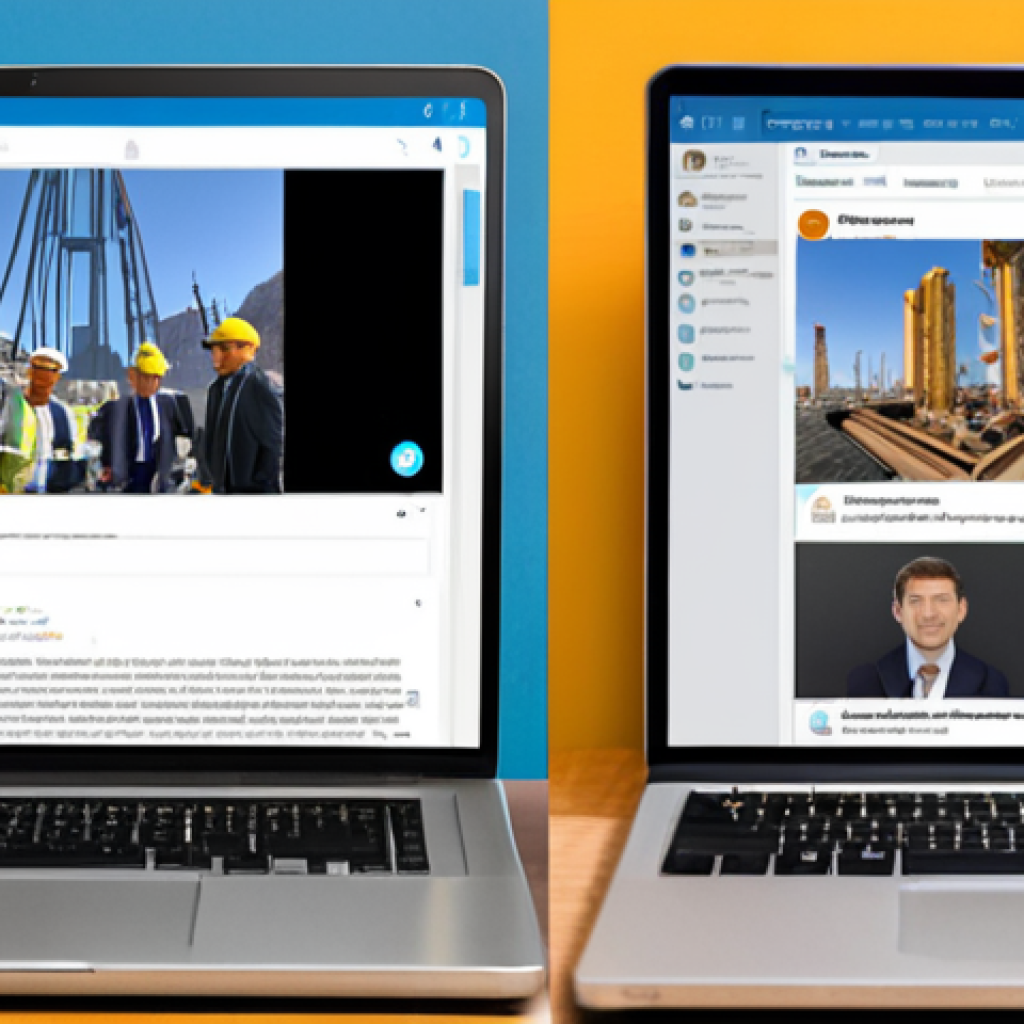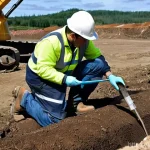Networking is critical for civil engineers to stay ahead, share insights, and discover new opportunities. From my own experience at industry conferences, I’ve seen how valuable those informal coffee chats can be – they often lead to unexpected collaborations and project leads!
The field is constantly evolving with new technologies like BIM and sustainable materials, so it’s important to stay connected. Online platforms and professional organizations also play a huge role in connecting engineers across the globe.
Let’s delve deeper and uncover the best ways for civil engineers to network effectively. Let’s explore this in more detail below!
Networking is critical for civil engineers to stay ahead, share insights, and discover new opportunities. From my own experience at industry conferences, I’ve seen how valuable those informal coffee chats can be – they often lead to unexpected collaborations and project leads!
The field is constantly evolving with new technologies like BIM and sustainable materials, so it’s important to stay connected. Online platforms and professional organizations also play a huge role in connecting engineers across the globe.
Let’s delve deeper and uncover the best ways for civil engineers to network effectively. Let’s explore this in more detail below!
Leveraging Industry Conferences and Events
Attending industry conferences is like stepping into a beehive of activity. It’s not just about listening to presentations; it’s about making connections.
I remember attending the ASCE (American Society of Civil Engineers) conference last year and striking up a conversation with an engineer who was dealing with similar challenges on a bridge project in California.
We exchanged ideas and even ended up collaborating on a research paper! These events often host workshops and training sessions which are perfect for networking in a smaller, more focused setting.
Making the Most of Conference Sessions
- Engage Actively: Don’t just sit passively during presentations. Ask questions, participate in discussions, and share your own experiences. I always try to prepare a few questions beforehand based on the speaker’s abstract.
- Follow Up: After a session, approach the speaker and introduce yourself. Share a brief anecdote about how their presentation resonated with you and exchange business cards. I keep a small notebook to jot down key takeaways and reminders to follow up later.
- Explore the Exhibit Hall: The exhibit hall is a goldmine of opportunities to connect with vendors, learn about new products, and meet fellow engineers. Grab a map and make a point to visit booths that align with your interests.
Networking Beyond the Scheduled Events
It’s not all about the keynote speeches. Some of the best connections happen during the informal gatherings. I’ve found that the evening receptions and dinners are great opportunities to mingle and build rapport.
Don’t be afraid to strike up a conversation with someone you don’t know.
- Attend Social Events: Conferences typically host social events like cocktail receptions or dinners. These are great opportunities to unwind and connect with fellow attendees in a relaxed setting. I always make sure to have a few conversation starters ready, like “What’s been the most interesting session you’ve attended so far?”
- Volunteer: Volunteering at a conference is a fantastic way to meet people and give back to the community. You’ll work alongside other volunteers and organizers, providing ample opportunities for networking. I volunteered at the registration desk last year and met several influential engineers who were impressed by my dedication.
- Use the Conference App: Most conferences have their own app that allows you to browse the attendee list, send messages, and schedule meetings. Use the app to connect with people you want to meet and arrange a coffee break or lunch together.
Joining Professional Organizations
Professional organizations are more than just resume boosters; they’re hubs for networking and professional development. I’ve been a member of ASCE for years, and it’s opened doors to countless opportunities.
They offer a wide range of resources, from online forums to local chapter meetings, making it easy to connect with engineers in your area and beyond. The sense of community is powerful, and it’s reassuring to know you have a network of peers to turn to for advice and support.
ASCE: A Case Study in Professional Networking
- Local Chapter Involvement: Joining your local ASCE chapter is a great way to connect with engineers in your community. Attend chapter meetings, participate in volunteer activities, and get involved in leadership positions. I joined the chapter’s outreach committee and helped organize a STEM event for local students, which was both rewarding and a great networking opportunity.
- Specialty Conferences: ASCE hosts numerous specialty conferences throughout the year, focusing on specific areas of civil engineering like structural engineering, geotechnical engineering, and water resources. These conferences offer a more targeted networking experience, allowing you to connect with experts in your field.
- Online Forums: ASCE’s online forums are a valuable resource for asking questions, sharing insights, and connecting with engineers from around the world. I regularly participate in the structural engineering forum, where I’ve received helpful advice on challenging projects.
Exploring Other Relevant Organizations
ASCE isn’t the only game in town. Depending on your specific interests, there are other professional organizations that may be a better fit. For example, if you’re interested in sustainable infrastructure, you might consider joining the Institute for Sustainable Infrastructure (ISI).
- Institute for Sustainable Infrastructure (ISI): ISI is a non-profit organization that promotes sustainable infrastructure practices. They offer the Envision sustainability rating system, which helps engineers design and build more sustainable projects. Joining ISI can help you connect with engineers who are passionate about sustainability and learn about the latest trends in the field.
- American Public Works Association (APWA): APWA is a professional organization for public works professionals. They offer training, certification, and networking opportunities for engineers who work in the public sector. Joining APWA can help you connect with engineers who are working on projects that benefit the public, such as roads, bridges, and water systems.
- National Society of Professional Engineers (NSPE): NSPE is a professional organization for licensed professional engineers. They advocate for the engineering profession and provide resources for professional development and ethical practice. Joining NSPE can help you stay up-to-date on the latest regulations and best practices, and connect with other licensed engineers in your area.
Utilizing Online Platforms and Social Media
In today’s digital age, online platforms are essential tools for networking. LinkedIn is a must-have for any civil engineer, allowing you to connect with colleagues, share your expertise, and stay informed about industry news.
But don’t limit yourself to LinkedIn; there are other platforms like online forums and industry-specific groups that can also be valuable. The key is to be active and engaged, sharing your insights and participating in discussions.
LinkedIn: Your Professional Online Hub
- Optimize Your Profile: Your LinkedIn profile is your online resume, so make sure it’s complete and up-to-date. Highlight your skills, experience, and accomplishments, and use keywords that recruiters and potential employers are likely to search for. I always recommend including a professional headshot and a well-written summary that showcases your unique value proposition.
- Join Relevant Groups: LinkedIn has numerous groups for civil engineers, focusing on specific areas like structural engineering, transportation, and environmental engineering. Joining these groups allows you to connect with like-minded professionals, share your expertise, and ask questions. I’m a member of several structural engineering groups and have found them to be a valuable resource for staying up-to-date on the latest industry trends.
- Engage Actively: Don’t just passively scroll through your LinkedIn feed. Share your own content, comment on other people’s posts, and participate in discussions. I try to share an article or insight at least once a week to stay top-of-mind with my network.
Exploring Online Forums and Communities
Beyond LinkedIn, there are other online platforms where civil engineers can connect and share information. Online forums and communities can be a great way to get answers to technical questions, share your experiences, and learn from others.
- Eng-Tips Forums: Eng-Tips is a popular online forum for engineers of all disciplines, including civil engineering. The forums are organized by topic, making it easy to find discussions relevant to your interests. I’ve used Eng-Tips to get help with challenging design problems and to share my own solutions with others.
- Reddit Communities: Reddit has several communities (subreddits) dedicated to civil engineering, such as r/civilengineering and r/StructuralEngineering. These communities are a great place to ask questions, share news, and discuss industry trends. I find the Reddit communities to be a more informal and interactive way to connect with other engineers.
- Industry-Specific Forums: Depending on your area of expertise, there may be other online forums and communities that are specific to your field. For example, if you’re a geotechnical engineer, you might consider joining the GeoWorld community.
Mentorship Programs and Reverse Mentoring
Mentorship is a two-way street. As a senior engineer, I’ve had the opportunity to mentor younger engineers, and it’s been incredibly rewarding to see them grow and develop.
But I’ve also learned a lot from them. Reverse mentoring, where younger engineers mentor senior engineers on new technologies or trends, can be just as valuable.
These relationships foster a culture of learning and collaboration, which benefits everyone involved.
The Benefits of Mentorship for Mentees
- Guidance and Support: A mentor can provide guidance and support as you navigate your career path. They can help you set goals, identify opportunities, and overcome challenges. My mentor helped me develop a strategic career plan and connected me with influential people in the industry.
- Networking Opportunities: Mentors often have extensive networks and can introduce you to people who can help you advance your career. My mentor introduced me to a project manager who offered me an internship, which ultimately led to a full-time job.
- Skill Development: Mentors can help you develop your technical and soft skills. They can provide feedback on your work, share their expertise, and help you identify areas where you need to improve. My mentor helped me improve my communication and presentation skills, which have been invaluable throughout my career.
The Benefits of Mentorship for Mentors
Mentoring is not just beneficial for the mentee; it can also be a rewarding experience for the mentor. As a mentor, you have the opportunity to share your knowledge and experience, give back to the community, and develop your leadership skills.
- Sharpening Skills: Teaching someone else forces you to revisit fundamental concepts and refine your own understanding. I found that explaining complex engineering principles to my mentee helped me solidify my own knowledge.
- Gaining New Perspectives: Mentees often bring fresh perspectives and new ideas to the table. I learned a lot from my mentee about new technologies and trends in the industry that I wasn’t aware of.
- Building Your Network: Mentoring can help you expand your network by connecting you with your mentee’s network. My mentee introduced me to several of his colleagues, who have become valuable contacts.
Volunteering and Community Engagement
Volunteering is not just a way to give back to the community; it’s also a great way to network with other professionals. Whether you’re volunteering at a Habitat for Humanity build or participating in a STEM outreach program, you’ll meet people who share your values and interests.
These shared experiences can form the foundation for lasting relationships. Plus, volunteering demonstrates your commitment to making a difference, which is always a positive attribute.
Local Community Projects
- Habitat for Humanity: Volunteering with Habitat for Humanity is a great way to use your engineering skills to help build affordable housing for families in need. You’ll work alongside other volunteers, including engineers, construction workers, and community members. I volunteered on a Habitat for Humanity project last year and met several engineers who shared my passion for giving back to the community.
- Local Infrastructure Projects: Many communities have local infrastructure projects that need volunteers. These projects might involve repairing bridges, building parks, or improving water systems. Contact your local government or community organizations to find out about volunteer opportunities in your area. I volunteered on a project to build a new playground in my neighborhood and met several engineers who were passionate about making our community a better place.
- STEM Outreach Programs: Volunteering with STEM outreach programs is a great way to inspire the next generation of engineers. You can volunteer at schools, museums, or community centers to teach kids about science, technology, engineering, and math. I volunteered at a local elementary school and taught kids about bridge design using K’NEX building toys.
Professional Society Volunteering
Professional societies also offer volunteer opportunities. This allows you to network with other engineers while working towards the society’s goals.
- Committee Work: Most professional societies have committees that focus on specific areas, such as education, advocacy, or membership. Volunteering on a committee is a great way to get involved in the society and network with other members. I volunteered on the ASCE’s education committee and helped develop a series of webinars for civil engineers.
- Conference Assistance: Volunteering at professional conferences is a good way to attend events, network with attendees, and assist with running of the conference. I volunteered at the ASCE’s conference registration desk and met several engineers and industry leaders.
- Mentoring Programs: Participate in mentorship programs offered by societies. This allows you to share your experiences and knowledge while guiding younger engineers.
Maintaining Relationships and Following Up
Networking isn’t just about making connections; it’s about maintaining them. After you meet someone, follow up with a personalized email or LinkedIn message.
Share an article that you think they’d find interesting, or invite them for a coffee. Remember, building strong relationships takes time and effort, but it’s worth it in the long run.
These connections can lead to new opportunities, collaborations, and lifelong friendships. Here’s a table summarizing key networking strategies for civil engineers:
| Strategy | Description | Benefits |
|---|---|---|
| Industry Conferences | Attending conferences and workshops | Learning new trends, making connections |
| Professional Organizations | Joining and participating in organizations like ASCE | Networking, professional development |
| Online Platforms | Using LinkedIn, forums, and social media | Connecting with professionals globally |
| Mentorship Programs | Participating as a mentor or mentee | Career guidance, skill development |
| Volunteering | Engaging in community projects | Giving back, building relationships |
Personalized Follow-Up Strategies
- Send a Thank-You Note: After meeting someone at a conference or event, send a personalized thank-you note within 24 hours. Refer to something specific you discussed to show that you were engaged in the conversation. I always handwrite my thank-you notes to add a personal touch.
- Connect on LinkedIn: Connect with new contacts on LinkedIn and send a personalized message referencing your conversation. This helps keep the connection alive and allows you to stay in touch. I always include a note about something we discussed to jog their memory.
- Share Relevant Content: If you come across an article, blog post, or news item that you think a contact would find interesting, share it with them. This shows that you’re thinking of them and provides value. I use a tool called Feedly to curate content that I can easily share with my network.
Nurturing Long-Term Relationships
Building a strong network is not a one-time effort; it requires ongoing maintenance. Regularly check in with your contacts, offer help when you can, and attend industry events together.
- Schedule Regular Check-Ins: Set a reminder to reach out to your key contacts every few months. Send them a quick email or give them a call to catch up. I use a CRM tool to track my interactions with my network and schedule reminders to follow up.
- Offer Help: Be generous with your time and resources. If you can help a contact with a project, make an introduction, or offer advice, do so. This builds goodwill and strengthens the relationship. I always try to find ways to help my contacts, whether it’s by sharing my expertise or connecting them with someone who can help them.
- Attend Industry Events Together: Invite your contacts to attend industry events with you. This provides an opportunity to network together and strengthen your bond. I always make a point to invite my key contacts to attend the ASCE conference with me.
Networking isn’t just a career booster; it’s about fostering a community. The connections I’ve made at conferences, through ASCE, and online have enriched my professional life immeasurably.
By actively engaging, you not only enhance your career but also contribute to the collective knowledge and growth of the civil engineering community. So get out there, connect, and build lasting relationships!
In Conclusion
Civil engineering thrives on collaboration and shared knowledge. Whether you’re a seasoned pro or just starting out, networking offers invaluable opportunities to learn, grow, and contribute. Embrace these strategies, stay curious, and watch your career flourish within a supportive community. Remember, every connection holds the potential to spark innovation and advance our field.
Useful Tips
1. Always carry business cards. You never know when you’ll meet someone interesting!
2. Customize your LinkedIn invitation message. A generic invite is easily ignored.
3. Set realistic networking goals. Aim for quality over quantity in your interactions.
4. Attend local chapter meetings. It’s a fantastic way to connect with engineers in your area.
5. Practice your elevator pitch. Be ready to concisely explain who you are and what you do.
Key Takeaways
Effective networking involves active participation in industry conferences, leveraging professional organizations like ASCE, and utilizing online platforms such as LinkedIn. Mentorship programs provide invaluable guidance, and volunteering opportunities help build relationships while giving back to the community. Remember to maintain these connections with personalized follow-ups and consistent engagement.
Frequently Asked Questions (FAQ) 📖
Q: What’s the real benefit of networking for a seasoned civil engineer who already has a stable job?
A: I get it, sometimes it feels like you’re set and networking is for those still looking. But honestly, even if you’re comfortable in your current role, networking can be a total game-changer.
Take it from me – I thought I had it all figured out until I went to a conference and chatted with a fellow engineer about some innovative concrete solution they were using.
That conversation led to me implementing a similar technique on one of my projects, saving the company a ton of money and boosting my reputation. Staying connected gives you access to new ideas, helps you anticipate industry trends, and even opens doors to consulting opportunities or partnerships you never thought possible.
It’s about continuous learning and keeping your skillset sharp.
Q: I’m terrible at small talk.
A: re there any specific tips for civil engineers to network without feeling awkward? A2: Trust me, you’re not alone! The “networking as mingling” concept is the worst.
Instead, focus on shared interests within the civil engineering world. Think about conferences, workshops, or even online forums related to specific areas like bridge design or environmental engineering.
Instead of going in with a blank slate, prepare a few questions about the speakers or the topics being discussed. “Hey, I noticed you were asking about soil stabilization techniques during the presentation; have you ever used [specific method] on a project?” That’s way more natural than, “So, uh, what do you do?” Also, don’t underestimate the power of a good LinkedIn group.
Share articles you find interesting or comment thoughtfully on other people’s posts. It’s networking from your desk!
Q: Are there specific professional organizations or online platforms that are particularly useful for civil engineers looking to expand their network?
A: Absolutely! Joining the American Society of Civil Engineers (ASCE) is a no-brainer. They have local chapters, conferences, and a ton of resources for professional development.
Plus, attending local chapter meetings is a great way to meet other engineers in your area. I’ve also found LinkedIn to be surprisingly useful, especially for connecting with engineers in specific industries or specializations.
Look for groups focused on things like BIM, sustainable infrastructure, or transportation engineering. Finally, don’t forget the power of university alumni networks.
They often host events and can be a valuable source of contacts and mentorship opportunities within your field.
📚 References
Wikipedia Encyclopedia
구글 검색 결과
구글 검색 결과
구글 검색 결과
구글 검색 결과
구글 검색 결과






